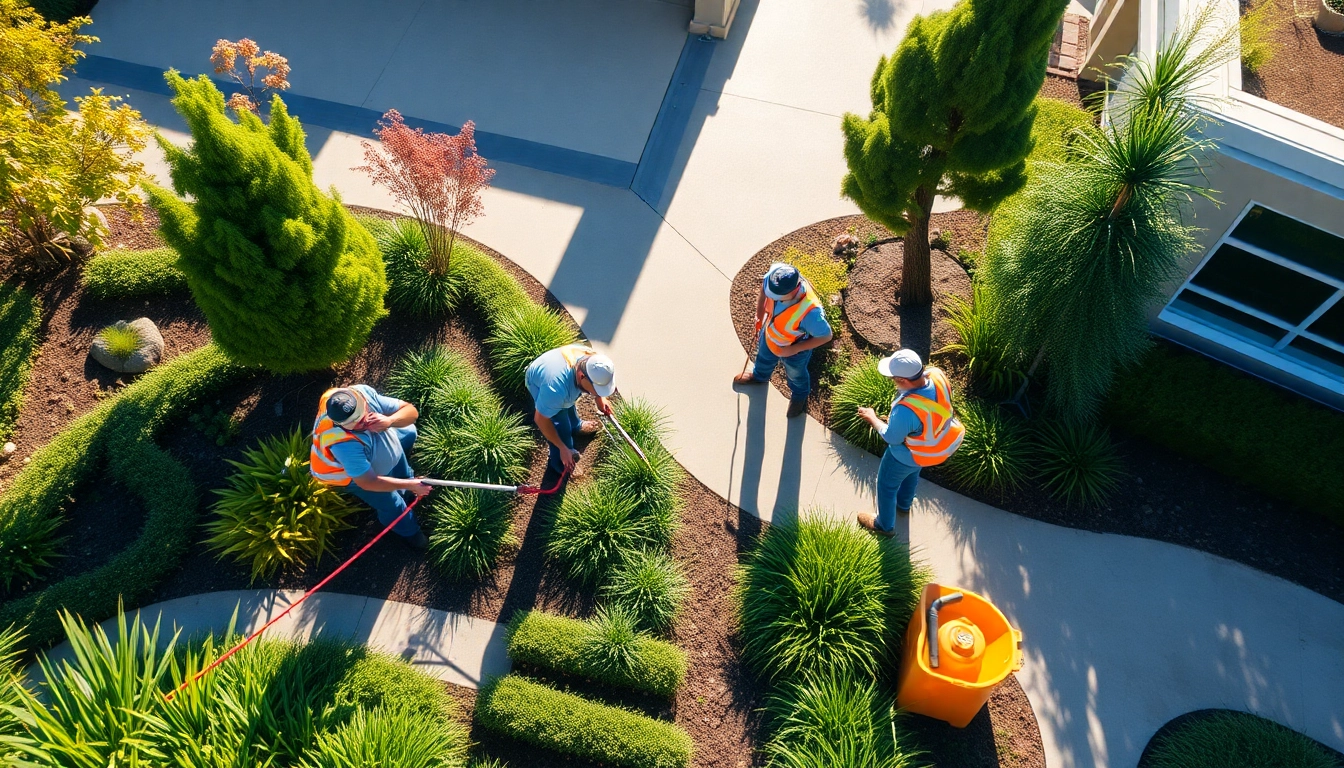Understanding Commercial Landscaping Contractors
What Are Commercial Landscaping Contractors?
Commercial landscaping contractors are professional service providers specializing in the design, installation, and maintenance of outdoor spaces for businesses and institutions. Unlike residential landscapers, who typically work on private homes, commercial contractors focus on larger projects such as corporate campuses, parks, shopping centers, and other facilities that require a more extensive and often more complicated approach. These contractors possess not only a keen sense of aesthetics but also a profound understanding of environmental considerations, local regulations, and the specific needs of commercial property owners.
Key Services Offered
Commercial landscaping contractors offer a variety of services tailored to meet the needs of business environments effectively. Some key services include:
- Landscape Design: Involves the planning of gardens, lawns, and other outdoor spaces to enhance beauty and functionality.
- Hardscaping: Includes the installation of non-plant elements such as walkways, patios, retaining walls, and water features.
- Lawn Care: Encompasses regular mowing, fertilization, pest control, and irrigation system management.
- Tree & Shrub Maintenance: Involves planting, pruning, and removal services to ensure healthy trees and shrubs.
- Irrigation Systems: Design and installation of efficient watering systems tailored to the specific needs of the landscape.
- Seasonal Clean-up: Preparation of landscapes for winter and spring through leaf removal, aeration, and mulching.
Benefits of Hiring Landscaping Professionals
Hiring professional commercial landscaping contractors brings numerous benefits that extend beyond just aesthetics. These include:
- Expertise: Professionals are trained and experienced in the latest landscaping trends and techniques, ensuring high-quality work.
- Time-Saving: Outsourcing these tasks allows business owners to focus on their core operations while the contractors handle the landscaping.
- Cost-Effectiveness: By having precise knowledge of materials and labor, contractors can reduce waste and provide efficient solutions.
- Increased Property Value: Well-maintained landscapes can significantly enhance the value of a property, attracting more business and clients.
- Environmental Expertise: Professionals can implement sustainable and eco-friendly practices to conserve resources and promote biodiversity.
Choosing the Right Commercial Landscaping Contractor
Evaluating Expertise and Experience
When selecting a landscaping contractor, it is crucial to evaluate their expertise and experience thoroughly. Start by requesting a portfolio showcasing past projects. Pay attention to projects that resemble your needs to gauge their capability. Inquire about their years in business, asking how long they have been working in the commercial sector specifically. This evaluation provides insight into their reliability and professionalism.
Asking the Right Questions Before Hiring
Before finalizing your choice, asking pertinent questions can drastically affect your satisfaction with a contractor’s service. Consider the following inquiries:
- What is your approach to project management and timelines?
- Can you provide references from previous commercial clients?
- How do you assess and manage environmental impacts?
- What kind of warranties or guarantees do you offer for your work?
- How do you handle unexpected changes or challenges during the project?
Comparing Quotes Effectively
Obtaining quotes from multiple landscaping contractors is vital for making an informed decision. However, it is critical to compare these quotes on a like-for-like basis. Ensure that each quote includes detailed breakdowns of the costs associated with materials, labor, and potential additional services. Take time to understand what each contractor includes, as the cheapest option may not always provide the best value.
Best Practices for Commercial Landscaping Projects
Planning and Design Strategies
Effective planning and design are paramount in achieving a landscape that meets your commercial needs. Begin by considering the purpose of the space. Will it be used for relaxation, events, or enhancing curb appeal? Collaborate with your landscaping contractor to create a cohesive plan that considers elements such as plant selection, seasonal interests, and sustainability. Usage of native plants, xeriscaping, and water-efficient designs can enhance both beauty and functionality.
Maintenance Tips for Longevity
To ensure that your landscaped areas remain healthy and vibrant over time, adhering to proper maintenance protocols is essential. Regular scheduled maintenance services should include:
- Routine assessments to identify any pests or diseases early.
- Consistent pruning and trimming for trees and shrubs to promote healthy growth.
- Weed management to prevent competition for resources.
- Irrigation checks to ensure systems are working efficiently and effectively.
Eco-friendly Landscaping Solutions
Incorporating eco-friendly practices in commercial landscaping can significantly impact environmental sustainability and cost savings. Consider solutions such as:
- Utilizing drought-resistant plants to minimize water usage.
- Implementing rain gardens that capture rainwater and reduce runoff.
- Using organic fertilizers and pest control methods to protect local ecosystems.
- Incorporating permeable paving that allows water to filter through, reducing flooding and erosion.
Challenges Faced by Commercial Landscaping Contractors
Common Obstacles in Project Execution
Commercial landscaping projects often face numerous challenges that can impede successful completion. These challenges can include budget overruns, delays caused by weather conditions, and resource shortages. One common solution is to develop a comprehensive project timeline with built-in contingencies for potential obstacles. Clear communications and regular updates between clients and contractors can help navigate these issues more smoothly.
Managing Client Expectations
Properly managing client expectations is essential for maintaining a positive relationship. Continuous engagement with detailed progress reports and consultations will help ensure that the project stays aligned with the client’s vision. Before starting the project, set realistic timelines and deliverables, ensuring all parties understand the scope of work and any limitations.
Adapting to Weather Conditions
Weather plays a significant role in outdoor projects, and contractors must remain adaptable to changing conditions. Create a flexible project schedule that accounts for environmental factors, allowing adjustments as necessary. In some cases, alternative plans should be developed in advance to avoid costly delays during adverse weather periods.
Measuring Success in Commercial Landscaping
Key Performance Metrics
Success in commercial landscaping can be measured using a range of key performance metrics. These may include:
- Cost Control: Tracking expenses against budgets to ensure financial objectives are met.
- Time Management: Evaluating whether projects were completed on schedule.
- Quality of Work: Assessing the durability and aesthetics of the completed landscape.
- Client Satisfaction: Gathering feedback from clients regarding their overall experience.
Client Satisfaction and Feedback
Regularly solicit feedback from clients is crucial in evaluating service quality. Conduct surveys or hold post-project meetings to gather insights about their satisfaction levels and areas requiring improvement. This feedback loop can inform future projects and strengthen relationships with current clients.
Long-term Value and Impact Assessment
Finally, assess the long-term value of your landscaping projects. This includes evaluating how well the landscape serves its intended purpose over time. Consider factors such as increases in property value, tenant satisfaction, and even the economic impact on surrounding areas. Tracking these metrics will not only guide future projects but also validate the investment in professional landscaping services.



